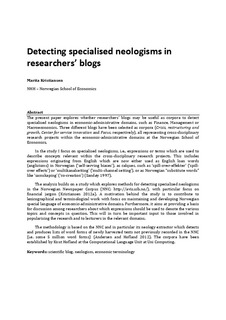Detecting specialised neologisms in researchers’ blogs
Journal article, Peer reviewed
Published version
Permanent lenke
http://hdl.handle.net/11250/2600857Utgivelsesdato
2013Metadata
Vis full innførselSamlinger
- Articles (FSK) [28]
- Publikasjoner fra CRIStin (NHH) [249]
Originalversjon
10.15845/bells.v3i1.366Sammendrag
The present paper explores whether researchers’ blogs may be useful as corpora to detect specialised neologisms in economic-administrative domains, such as Finance, Management or Macroeconomics. Three different blogs have been selected as corpora (Crisis, restructuring and growth, Center for service innovation and Focus, respectively), all representing cross-disciplinary research projects within the economic-administrative domains at the Norwegian School of Economics. In the study I focus on specialised neologisms, i.e., expressions or terms which are used to describe concepts relevant within the cross-disciplinary research projects. This includes expressions originating from English which are now either used as English loan words (anglicisms) in Norwegian (‘self-serving biases’), as calques, such as ‘spill-over-effekter’ (‘spill-over effects’) or ‘multikanalsetting’ (‘multi-channel setting’), or as Norwegian “substitute words” like ‘samskaping’ (‘co-creation’) (Sandøy 1997). The analysis builds on a study which explores methods for detecting specialised neologisms in the Norwegian Newspaper Corpus (NNC; http://avis.uib.no/), with particular focus on financial jargon (Kristiansen 2012a). A motivation behind the study is to contribute to lexicographical and terminological work with focus on maintaining and developing Norwegian special language of economic-administrative domains. Furthermore, it aims at providing a basis for discussion among researchers about which expressions should be used to denote the various topics and concepts in question. This will in turn be important input to those involved in popularising the research and to lecturers in the relevant domains. The methodology is based on the NNC and in particular its neology extractor which detects and produces lists of word forms of newly harvested texts not previously recorded in the NNC (i.e. some 5 million word forms) (Andersen and Hofland 2012). The corpora have been established by Knut Hofland at the Computational Language Unit at Uni Computing. Keywords: scientific blog, neologism, economic terminology

